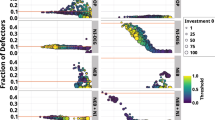Abstract
As one method of cooperation in human society, informal financial institutions, such as a ROSCA, demonstrate huge rule disparities temporally and geographically. In this paper, we attempt to understand whether and how people’s preference of a ROSCA is related to the reciprocity level in a particular society. After conducting evolutionary imitation games among the population, the results show that each ROSCA rule evolves as if it finds its niche formed by the peoples’ different levels of reciprocity. Our simulation also reproduced the social states where different ROSCAs co-exist with others at an equilibrium even when some rules clearly dominate others. These results provide a new insight into the theory of collective rule choice that triggers the evolution of cooperation.
Access this chapter
Tax calculation will be finalised at checkout
Purchases are for personal use only
Similar content being viewed by others
References
Trivers, R.L.: The evolution of reciprocal altruism. Q. Rev. Biol. 46(1), 35–57 (1971)
Axelrod, R., Hamilton, W.D.: The evolution of cooperation. Science 211(4489), 1390–1396 (1981)
Nowak, M.A.: Five rules for the evolution of cooperation. Science 314(5805), 1560–1563 (2006)
Nowak, M.A., Sigmund, K.: Evolution of indirect reciprocity. Nature 437(7063), 1291 (2005)
Koike, S., Nakamaru, M., Tsujimoto, M.: Evolution of cooperation in rotating indivisible goods game. J. Theor. Biol. 264(1), 143–153 (2010)
Besley, T., Coate, S., Loury, G.: The economics of rotating savings and credit associations. Am. Econ. Rev. 83, 792–810 (1993)
Anderson, C., Kilduff, G.J.: The pursuit of status in social groups. Curr. Dir. Psychol. Sci. 18(5), 295–298 (2009)
Bisrat, A., Kostas, K., Feng, L.: Are there financial benefits to join RoSCAs? Empirical evidence from equb in Ethiopia. Procedia Econ. Finan. 1, 229–238 (2012)
Sandsør, A.M.J.: The rotating savings and credit association: an economic, social and cultural institution (2010)
Calomiris, C.W., Rajaraman, I.: The role of ROSCAs: lumpy durables or event insurance? J. Dev. Econ. 56(1), 207–216 (1998)
Klonner, S.: Rotating savings and credit associations when participants are risk averse. Int. Econ. Rev. 44(3), 979–1005 (2003)
Ashraf, N., Bohnet, I., Piankov, N.: Decomposing trust and trustworthiness. Exp. Econ. 9(3), 193–208 (2006)
Gugerty, M.K.: You can’t save alone: commitment in rotating savings and credit associations in Kenya. Econ. Dev. Cult. Change 55(2), 251–282 (2007)
Ambec, S., Treich, N.: Roscas as financial agreements to cope with self-control problems. J. Dev. Econ. 82(1), 120–137 (2007)
Tanaka, T., Camerer, C.F., Nguyen, Q.: Risk and time preferences: linking experimental and household survey data from Vietnam. Am. Econ. Rev. 100(1), 557–571 (2010)
Bouman, F.J.A.: Rotating and accumulating savings and credit associations: a development perspective. World Dev. 23(3), 371–384 (1995)
Geertz, C.: The rotating credit association: a “middle rung” in development. Econ. Dev. Cult. Change 10(3), 241–263 (1962)
Kovsted, J., Lyk-Jensen, P.: Rotating savings and credit associations: the choice between random and bidding allocation of funds. J. Dev. Econ. 60(1), 143–172 (1999)
Wang: The history of Chinese Hehui. Zhongguo Hezuo Xueshe (1930)
Tanaka, T., Nguyen, Q.: ROSCA as a saving commitment device for sophisticated hyperbolic discounters: field experiment from Vietnam. Working Paper, Arizona State University (2010)
Besley, T.: Savings, credit and insurance. In: Behrman, J, Srinivasan, T.N. (eds.) Handbook of Development Economics, pp. 2123–2207 (1995)
Author information
Authors and Affiliations
Corresponding author
Editor information
Editors and Affiliations
Rights and permissions
Copyright information
© 2019 Springer Nature Switzerland AG
About this paper
Cite this paper
Sijia, Z., Horita, M. (2019). Reciprocity and Rule Preferences of a Rotating Savings and Credit Association (ROSCA) in China: Evolutionary Simulation in Imitation Games. In: Morais, D., Carreras, A., de Almeida, A., Vetschera, R. (eds) Group Decision and Negotiation: Behavior, Models, and Support. GDN 2019. Lecture Notes in Business Information Processing, vol 351. Springer, Cham. https://doi.org/10.1007/978-3-030-21711-2_4
Download citation
DOI: https://doi.org/10.1007/978-3-030-21711-2_4
Published:
Publisher Name: Springer, Cham
Print ISBN: 978-3-030-21710-5
Online ISBN: 978-3-030-21711-2
eBook Packages: Computer ScienceComputer Science (R0)




